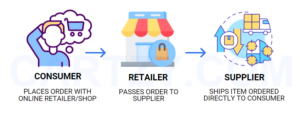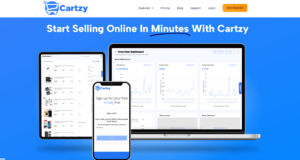The e-commerce landscape has been forever changed by the rise of dropshipping, providing people from all sorts of backgrounds a way into retail entrepreneurship minus the usual problems on inventory, warehousing, and even staff management. Dropshipping offers flexibility and accessibility, which makes it a very lucrative business even for beginners.

When Shopify rose to fame in the 2010s, it quickly became a popular option for dropshipping because of its beginner-friendly tools and features, such as payment processing, personalization of stores, and integration of other ecommerce software, apps, plugins, and platforms. These integrations allow for a smooth connection with suppliers and importation of products, and streamlines order fulfillment, which can all be done within the Shopify platform.
A lot of the popular and successful online stores we know now actually use Shopify for their stores, such as fitness apparel store Gymshark, cosmetics stores Kylie Cosmetics and Colourpop, clothing brand Fashion Nova, and footwear brand Allbirds.

Can you do dropshipping without Shopify? Is the success of the stores mentioned possible even outside Shopify’s platform? Today, Shopify still caters to millions of dropshippers and store owners, but a lot of other similar e-commerce platforms have also gained traction as alternatives to Shopify, some even better.
Because of the platform’s popularity and user base, it’s no question that their services and subscription plans would be considerably more expensive than that of the alternatives. Sure, the basic plan is offered at a reasonable starting price, but as you scale your business, you would want platform costs that would hinder you from doing so.
On the topic of scaling your business, once your dropshipping store grows significantly, some features of Shopify might not scale with you. You may find that the basic plan won’t cover for the advanced features you would need, such as in checkout processes or warehouse integrations.
So, can you do dropshipping without Shopify? A resounding yes.
Choosing the Right Platform: Aligning with Your Business Model
How do you choose the right platform for your dropshipping store? Consider the following when looking for an alternative.
- Scalability: When you scale up, your platform should scale up with you. As you grow your product range and cater to a wider customer base, your store should be able to still perform smoothly and without a hitch.
- User Experience: Choose a platform that not only provides a good UX to you as a store owner, but to your customers as well in their shopping experience.
- Customization and Control: Consider how much control you as the store owner would have, not only on designing your shop but also on the platform functionalities.
- Cost-Effectiveness: Weigh the cost-benefit ratio – are the features accessible to you at a certain tier worth the monthly/annual platform fee?
Integration with Marketing Tools: Firstly, identify where and how you will be marketing your products. Next, ensure that your platform of choice can integrate with your marketing platform/tool. This way, you can easily access your store analytics and marketing stats and effectively piece it all together for better optimization.
Alternative Dropshipping Platforms
While Shopify is known for a lot of strong e-commerce features such as ease of use and extensive support, other platforms such as BigCommerce and WooCommerce also offer the same. Each platform has their own strengths, so we’ve made it easy for you to compare the biggest names below under the considerations we listed above.
| Feature / Platform | WooCommerce | BigCommerce | Magento | Wix & Squarespace | Cartzy | Marketplaces (Amazon, eBay, Etsy) |
| Customization | High; integrated with WordPress for extensive customization options. | High; offers advanced features out of the box. | Very High; deep customization for tech-savvy users. | Moderate; focuses on design and user experience. | Very High; user friendly UX/UI makes customization easy. | Low; limited by marketplace rules and structures. |
| User-Friendliness | Good for those familiar with WordPress. | Varied; simple for basic use, complex for advanced features. | Low; requires technical expertise or developer support. | High; known for intuitive interfaces and ease of use. | High; quickly set up your store with their easy training process. | High; easy to set up and start selling. |
| Pricing | Free plugin; costs arise from hosting, themes, extensions. | Competitive with Shopify; no transaction fees. | Free to start; significant costs for development and maintenance. | Varies; typically includes monthly subscription fees. | Competitive, no hidden cost, with options of basic plan and platinum plan. Lots of free apps included. | Varies; includes marketplace fees and commissions. |
| SEO and Content Marketing | Excellent seamless integration with WordPress. | Good; built-in SEO tools. | Good; customizable for SEO, but requires expertise. | Moderate; basic built-in SEO tools. | Highly dependent on user implementation. | Limited; primarily relies on the marketplace’s SEO. |
| Scalability | Good; scalable with WordPress but may require technical adjustments. | Excellent; built for scalability with comprehensive features. | Excellent; ideal for large-scale operations. | Moderate; tailored more towards small to medium businesses. | Very High; fully customizable to scale as needed. | Moderate; depends on marketplace policies and caps. |
| Flexibility | High; flexible due to open-source nature. | High; more advanced features available out of the box. | Very High; extremely flexible for those with technical know-how. | Moderate; flexible within the constraints of design-focused platforms. | High; complete control and responsibility. | Low; confined to the structure of the chosen marketplace. |
| Ease of Entry | Moderate; easier for those already using WordPress. | Moderate; straightforward for basic setup, complex for full utilization. | Low; requires significant investment in development. | High; simple setup and maintenance. | High; simple set up, a turnkey solution. | High; simple to start with existing customer bases. |
Cartzy – Best Dropshipping Alternative
A relatively new player in the e-commerce platforms landscape, Cartzy was built by actual, experienced dropshippers and digital marketers, hence you can be assured that all your needs are addressed with the platform’s tools and features when you build your store with Cartzy.
Cartzy is dropshipping made simple.

Not only do you get a brand new, customizable store when you join Cartzy, you also get free training on how you can best scale your dropshipping business within the platform. All plans come integrated with an upsell app, a product review app, and an exit wheel app at no additional cost. You are also provided with a fool-proof, tested, and optimized theme, which means you can build and launch a store in as fast as 15 minutes!
Start building your empire with Cartzy today, starting at $24/month for an annual plan, or $29/month on a monthly basis. Cartzy also offers a Platinum plan where you can branch out your dropshipping business and open two more stores, as well as access to an exclusive app, Profit Spy.
Can you do dropshipping without Shopify? YES. Success in the dropshipping field is not dependent on whether or not you are on the most popular platform. It still depends on your willingness to learn the bits and pieces of the business model, your ability to craft and optimize your marketing plans, and most importantly, your determination and will to succeed. Trust the process, and let your platform of choice work for you and with you!






